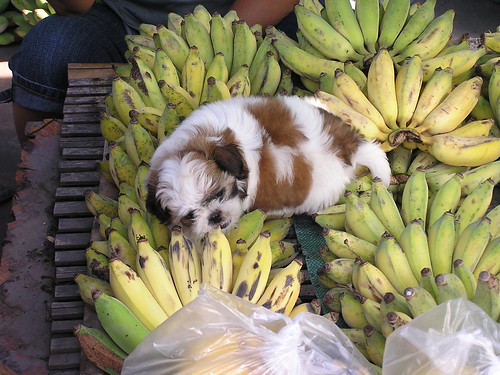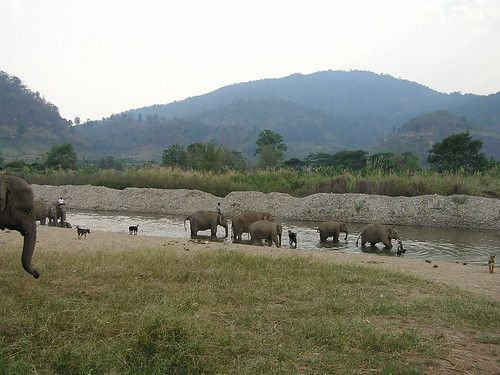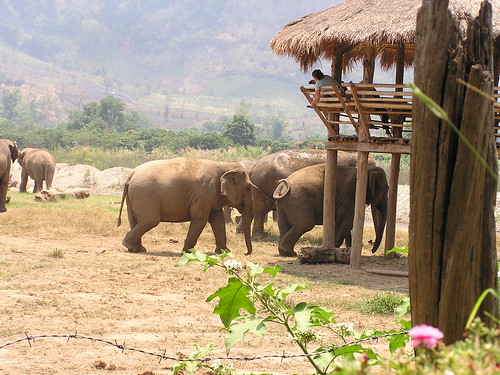(This is a terribly late post. I've been intending to post about our elephantic experience in Chiang Mai for quite some time...but it was a powerful experience, and I haven't quite been able to figure out how to talk about it, so previously I've taken the easy way out and avoided it. Sorry, and here is the long-awaited account!)
One aspect of our trip to Chiang Mai last month that I haven't told you about yet is our day at the Elephant Nature Park. The park was founded several years ago by a lady named Sangduan Chailert, nicknamed "Lek" (meaning small) to present a different type of elephant experience than is typically available here. Instead of a typical elephant camp which gives tourists the opportunity to ride elephants or see them painting or playing soccer, Lek has created a place where one can interact with elephants as they are "just being elephants", spending their days eating, sleeping, taking dust baths, and playing.
We were picked up from our hotel by our park guide, a young Akha man (the Akha are one of the hilltribes from northern Thailand/Laos) nicknamed "Mammoth" ("I'm not extinct!") He proved to be an expert guide, providing us with tons of elephant information and lots of truly awful elephant jokes.
(Why didn't the elephant go to university? Because he didn't graduate high school.)
Our first stop was at a local fruit market to pick up lunch for the elephants:


(Don't worry, the puppy was not a snack-- it was just teething on the bananas.)
A day visit to the park involves feeding and bathing the elephants in the river, as well as learning their stories. It is also possible to stay overnight or volunteer for a week or more (indeed, the volunteers have been responsible for raising the money to rescue many of the elephants here).
Around 11 AM, a bamboo knocker is "rung" and the elephants all come to the feeding platform for lunch:
That's Mammoth on the right, and Mae Boon and Aura (I think) on the left.
Lunch is fruit-- bananas, watermelon, and so on-- which is all fed by hand by the volunteers and visitors. The elephants are quite adept at handling the fruit. Josh and I found ourselves feeding Mae Boon, mainly, while nearby her 3-year-old baby, Aura, was practicing her coordination (she was more likely to drop her treats). Mae Boon is rather picky-- she would "reject" pieces of fruit that weren't to her liking, at least until they were the only ones left!
After the elephants ate, it was time for human lunch (yummy Thai food), signaled by the ringing of a bell.
After lunch it was time to bathe the elephants. This happens twice a day: the elephants are taken down to the river by their mahouts (handlers) and get thoroughly scrubbed, to keep their skin in top condition.
The elephants really enjoy this and will get into the spirit of things by splashing water about themselves. It was Songkran, so there was even more of an excuse for a full-scale water fight!
This was also an opportunity for the mahouts to reinforce the babies' training: although they are never expected to work, the babies are still trained in many of the most common commands, including giving "kisses". Baby Aura kissed me about 4 times over the course of the afternoon. I have no illusions, though: she was doing it for the slices of Wonder bread she was getting in return!
When the elephants have had enough, they get out of the river and wander over to the mud pit where they cover themselves with dust again. This was our opportunity to sit in the elevated "Beach Hut" and hear Lek, the park's founder, speak to us about her goals.
In the afternoon, we watched a National Geographic video about the park and the situation of elephants in Thailand, then we had time for more exploring, elephant-watching, and even a nap:

(Not only elephants, but many stray dogs and cats have found a good home at the park.)
Finally, we bathed the elephants one last time, and then piled back into the van for the trip back to Chiang Mai, tired, happy and thoughtful.
But our day at Elephant Nature Park wasn't all fun and games. I debated for a long time how to talk about this-- in fact, I had a very long and "sermonizing" post all planned out-- but I finally deleted it. Instead, I invite you to take a look at the park's website, which says everything I was going to say. I think the following pictures instead say it best:

This is Medo. She was employed in illegal logging, where a runaway tree trunk broker her ankle-- and an encounter with a berserk male left her with a dislocated pelvis. She is a young elephant, but she will never walk normally or without pain. Lek brought her to the park, where she can relax with other elephants, and spend lots of time in the river, which helps her feel better.

This is Max, or Maximus, one of the tallest elephants in Thailand. He's quite old and has worked in logging, tourism and street begging, before he was struck by a semi and badly injured-- his leg has never quite healed properly, and he continues to walk with a limp.
Another of the park's elephants, Jokia, is blind in both eyes from abuse. She spends her time with her best friend, Mae Perm, who is never far away and gently leads Jokia to and from the river and the feeding platform.
Sadly, most of the elephants at the park have similar histories. Elephants have little to no protection under Thai law, and so these situations of abuse are common and there is no legal recourse when it happens. The park staff and volunteers do what they can to rescue the most needy elephants, going to great lengths to fund the purchase (one young lady from the US asked her parents if, instead of giving her a car for graduation as they were planning, they could use the money to rescue an elephant).
Many other elephants suffer not out of outright malice, but lack of resources: elephants are expensive to keep, and now that logging has been banned in Thailand, they must find work where they can, in tourist camps, illegal logging, or street begging. Many of these elephants are still well-kept (treated as part of their owners' or handlers' families) but when resources are scarce, they can still be overworked or underfed, or go without medicine. The "Jumbo Express" project run by the Elephant Nature Foundation serves as a mobile elephant medical service, traveling deep into the interior to help elephants in need by providing medications and elephant husbandry information.
Ignorance is also a huge problem: one of Lek's main goals with her elephants is to prove that the brutal "traditional" training methods for elephants are not necessary, and are in fact counterproductive. There is a widespread belief than a young elephant's spirit must be forcibly broken through a ceremony called the pajaan, which involves confining the elephant in a cage, depriving it of food and water, and subjecting it to physical and psychological abuse. None of the babies at the Elephant Nature Park are subjected to this-- they are instead trained through gentle, positive-reinforcement methods with plenty of treats and cuddles available. To drive the point home, Lek forbids the mahouts at the park to use the ankus, or "hook" typically used to direct and control the elephant; although it can be used responsibly, she wants to show that it is not a necessity. The mahouts instead lead their elephants around by voice, or occasionally will tug on an ear to get the point across.
The message I brought away from our visit to the park was not that elephants and humans should lead separate lives-- but that there are better ways for elephants and humans to coexist than are commonly seen nowadays. I invite you to find a better way to interact with an elephant than to watch this:
All in all, it was an incredible experience, in many ways. I plan to head back to Elephant Nature Park at some point as a volunteer for a week, and I would strongly recommend that you plan to visit for a day or more if you find yourself in Chiang Mai. It is a life-changing place.




No comments:
Post a Comment